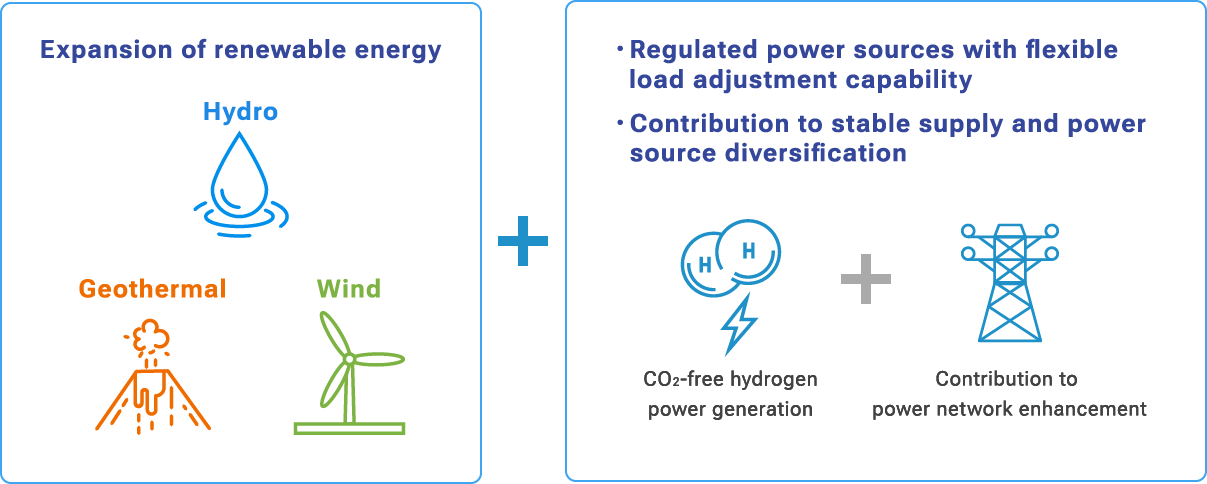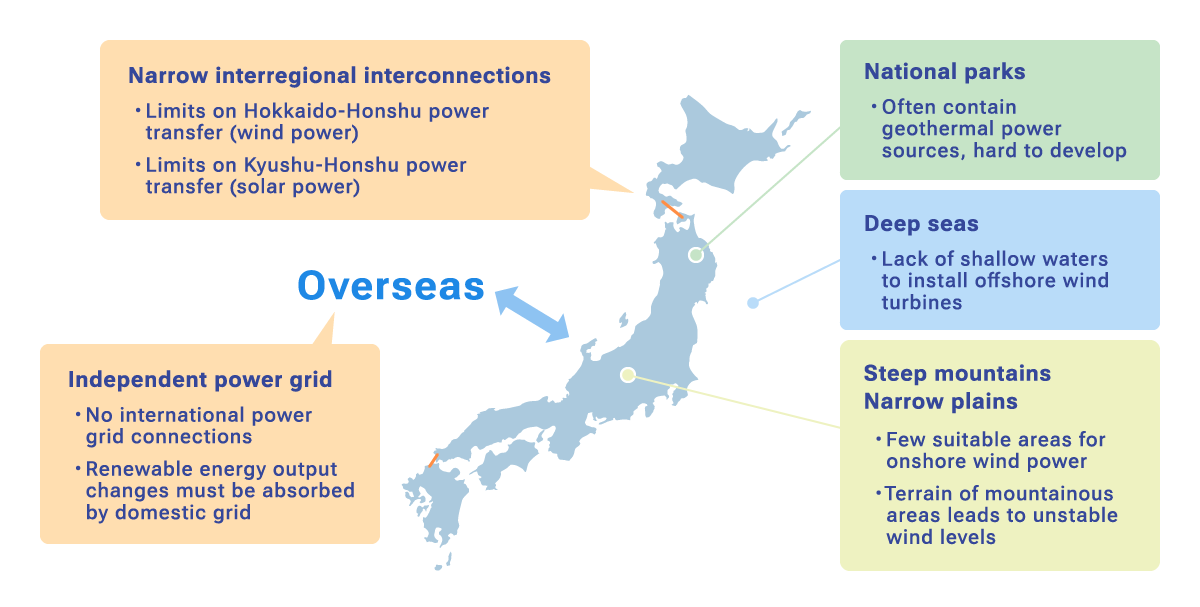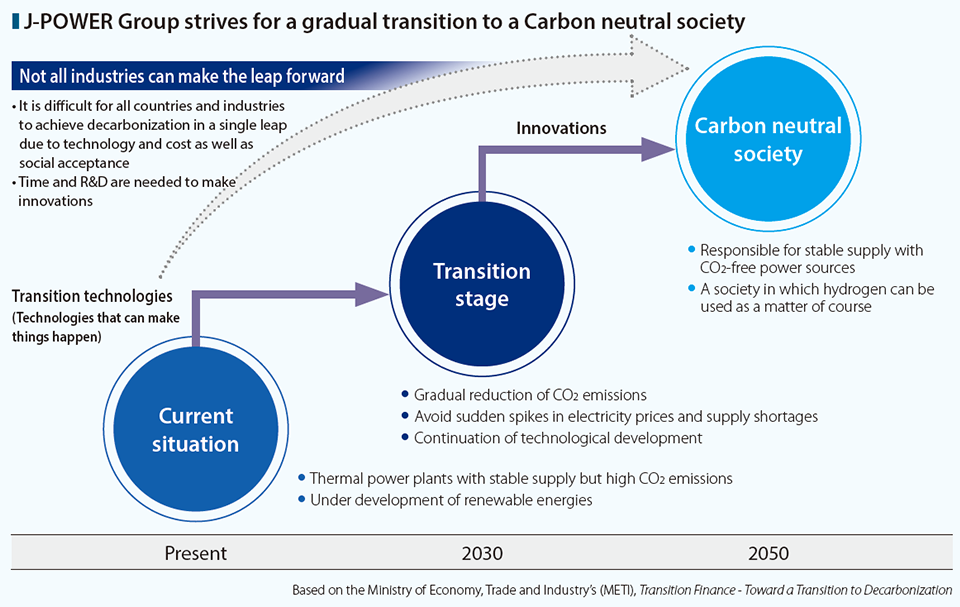J-POWER’s Environmental Response
Context Behind Formulating BLUE MISSION 2050
The stable supply of electricity and other energy is seen as the most important societal issue for supporting industry and daily living. As a leading company in the Japanese and global energy industries, J-POWER views both the stable supply of electricity and our response to climate change as management priorities, and has worked to balance business expansion with reductions in environmental impact. At the same time, since the U.N. adopted the Sustainable Development Goals (SDGs) in 2015, there has been strong demand for Japan’s public and private sectors to cooperate on global environmental protection initiatives. In the energy sector, in July 2020 the Japanese government clearly stated its basic policy for phasing out inefficient coal-fired power plants. In June 2021, the government released the Green Growth Strategy Through Achieving Carbon Neutrality in 2050 as guidelines for achieving sustainable growth and innovation in the age of decarbonization.
J-POWER announced Blue Mission 2050, an action plan to help realize a carbon-neutral, hydrogen society in February 2021, in advance of those government announcements and strategies. Blue Mission 2050 provides a roadmap for reducing CO2 emissions by 2050, at the same time clearly stating J-POWER’s vision and strategy and how that vision and strategy will form the basis of our contributions to achieving a carbon-neutral society. The goal of Blue Mission 2050 also conforms to Japan’s Nationally Determined Contribution (NDC) of a 46% reduction in greenhouse gas emissions by 2030.
With that aim of realizing a carbon-neutral society in 2050, J-POWER will work to reduce CO2 emissions through various initiatives, including expansion of renewable energy and development of CO2-free hydrogen power generation.
BLUE MISSION 2050: Three Pillars
In Blue Mission 2050, we set out the three pillars (measures) of our approach to realizing a carbon-neutral society: expansion of CO2-free power sources, CO2-free hydrogen power generation, and contribution to power network stability and enhancement. By actively investing management resources in these three important measures, we are helping to build social sustainability that is kind to the global environment.

Expansion of CO2-free power sources
We are leading progress toward a carbon-neutral society through development of renewable energy. Since early on, one of J-POWER’s priorities has been to focus its efforts on developing purely domestically produced energy, including hydro, wind, geothermal and biomass. In Japan, we are an industry leader, with a track record of over 60 hydroelectric power projects and the second-largest domestic market share of wind power output capacity. We will continue to focus our efforts on development of renewable energy as a source of CO2-free power, and will steadily continue construction of nuclear power plants, which can reliably generate large amounts of CO2-free power.
CO2-free hydrogen power generation
Using coal gasification technology and CCS/CCUS for separating, capturing and storing CO2, we will manufacture and supply CO2-free hydrogen and use it for power generation. Coal gasification is a technology that has been proved to be commercially viable through various demonstration test phases. We will also add gasification technology to existing thermal power plants, and move forward with mixed combustion of biomass and ammonia to achieve CO2 reductions more quickly. By using CO2-free electricity and hydrogen converted from fossil fuels, we will contribute to energy security and to stable energy supplies.
Contribution to power network stability and enhancements
There are two challenges to renewable energy development in Japan. One is the need for regulated power sources that can handle renewable energy output fluctuations, which vary with the seasons or time of day. The other is that the grid is not adequately equipped to send electricity from areas more suitable for renewable energy development (Hokkaido, Kyushu, etc.) to Honshu, where demand is highest. The J-POWER Group will therefore develop regulated power sources while at the same time developing power networks to accelerate the further expansion of renewable energy.

Transition Strategy
Realizing a sustainable society and achieving the related milestone of carbon neutrality is a social proposition that all countries share and should be working toward. However, the methods and processes of achieving these goals differ depending on each country’s economic and social conditions and industrial sectors. In addition, innovations that contribute to environmental impact reductions, and long-term research and development activities to support their implementation, are essential. Suddenly stopping or shutting down large power plants that use fossil fuels, for example, is not a realistic option. Therefore, a transition strategy is needed for conversion to renewable energy or other CO2-free power sources in stages.
Blue Mission 2050 is a medium- to long-term scenario for the transition to decarbonization, and takes into account the need to maintain stable supply and pricing of electricity, an important element in promoting social and economic activity. The J-POWER Group will actively invest its advanced technologies and knowledge in that scenario’s steady progress.
During the transition to a carbon-neutral society, in addition to using renewable energy we will support the stable supply of electricity with nuclear power generation, a CO2-free power source, and will also continue using thermal power generation while reducing CO2 emissions. To achieve carbon neutrality in 2050, J-POWER plans to develop new renewable energy sources and increase their value. In addition, we will aim to realize zero-emission thermal power in the future by moving forward with initiatives including CO2-free hydrogen power generation using coal gasification technology and CCS/CCUS, and mixed combustion with fuels such as biomass and ammonia.

J-POWER’s Medium- to Long-Term Vision
As a company responsible for the core economic and societal infrastructure that electric power provides, J-POWER has identified five medium- to long-term sustainability issues (material issues): energy supply, response to climate change, respect for people, engagement with local communities, and strengthening our business foundation. We will work to solve these issues through our business activities.
Going forward, J-POWER will steadily implement Blue Mission 2050 and make Group-wide efforts to address the SDGs, based on the corporate philosophy—We will meet people’s needs for energy without fail, and play our part in the sustainable development of Japan and the rest of the world—and thereby contribute to the realization of environmental and social sustainability. In addition, we plan to continuously expand our corporate value and create a corporate group that is trusted by all stakeholders, including customers, business partners, shareholders, employees and local communities.
